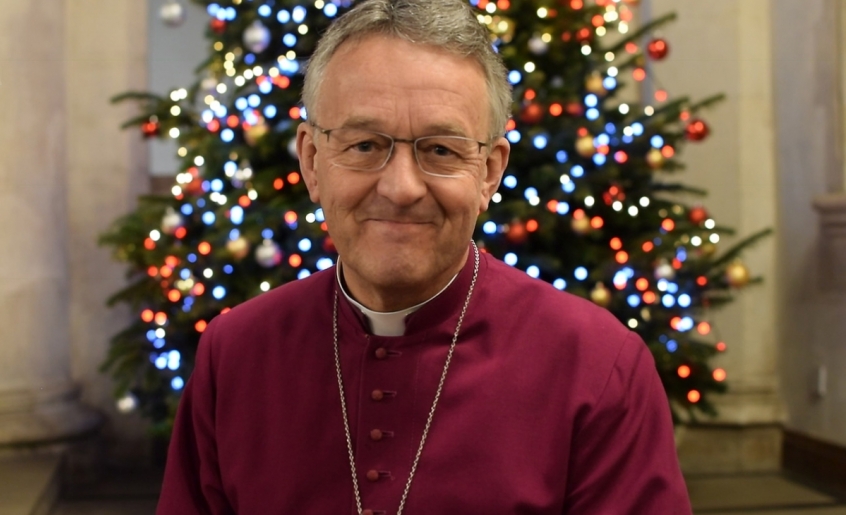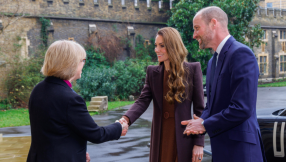The new Archbishop of Wales, John Davies, has released his Christmas message. In it, he says of Jesus: 'His message for us is that we must try to live our lives demonstrating a genuine, welcoming and loving concern for those around us. His very clear message for those who have responsibility for leading and governing the world's societies is that power is to be exercised within the framework of that concern as, even in our own society, divisions between the haves and the have-nots appear to grow ever wider, and as the voices suggesting that we should be concerned only for ourselves seem to get louder and louder.'
Christian Today interviewed the Archbishop today.

You've said 'the voices suggesting that we should be concerned only for ourselves seem to get louder and louder'. Can you expand on that?
One of the things I've noticed as a trustee of Christian Aid is that in certain areas of the media there seems to be an increasingly loud noise on the anti aid agenda, and that translates as self-interest coming first. Whereas there are increasing numbers of people living on the streets, demand for food banks and so forth. It sometimes just seems that people are beginning to feel think of yourself, just get on with your own life.
You have said you want to 'refresh' the Church in Wales, and – crucially – that 'It is not business as usual'.
Let's translate 'business as usual'. One of the caricatures of church is we are predominantly concerned with self-preservation. The view that I have expressed quite widely is that if in 2020, when we celebrate our centenary, all we can express is that we have survived – well that is not much to celebrate.
The role of the church is to root itself back in the ministry of Jesus and fundamentally to re-acquaint itself with what that ministry was all about – which is not self-interest but actually risking one's own self interest for the sake of others.
We need to keep saying it over and over again so that people do realise we are not just an institution there to serve itself.
Would you recommend disestablishment to the Church of England? Rowan Williams has said would not be a disaster.
It's not for me to speak for the Church of England and obviously I wasn't around when the Church in Wales was established. An interesting feature of the Church in Wales is that, despite fact that we're disestablished, we are still very much part of the heart of public life. Some would say it would be a disaster – I couldn't comment. Were it to deprive the CofE of its place in having a role in the debate that might be a bad thing. But speaking from my experience in Wales I don't think it would remove the Church from public life, and if it did that would be a bad thing, because the Church has a duty to speak.
Church attendance outside the cities is very low. Can churches recover the ground they lost over the last few decades?
That may well be linked to this whole idea of not business as usual. If people feel that what the life of the church is about is simply church attendance then maybe not. If on the other hand people can recapture a vision of the church as the servant of the community, and engaging people into bringing new life into new communities, and re-engage the church being the agent of sustaining the community, that could benefit many congregations.
Nonconformity in Wales has largely collapsed in the valleys and rural areas. How are things looking for the Church in Wales? Are you optimistic for future?
If I were a pessimist I wouldn't be in this job. It is without doubt the case that Nonconformity is struggling in many places very hard indeed. One of the areas is vocations and we ourselves find it difficult to recruit people to traditional forms of ministry. One of the things that needs to be taken into account if we hark back to what some would see as a golden age – that was an age when there wasn't quite frankly a lot else to do on a Sunday...whereas now there is a lot more to be done and therefore unless the Church can present a lively image of what its task really is and not denounce people who go shopping on a Sunday or play rugby on a Sunday then churches are in trouble. Churches should adapt.
Lots and lots of young people have ideals and persuasions that are very consistent with the Old Testament prophets but they haven't got much of a clue that this is what the Church stands for. We must show we really care about social justice, climate change and so on – then they would take more notice. If we decline, then we haven't presented our message correctly.
What do you think about groups like GAFCON and AMiE, set up in opposition to traditional Church structures?
Perhaps I can answer that by going back to the primates meeting in Canterbury in October – the media thought there would be a bloodbath. In the event, it was characterised by honest but respectful disagreement. The image of the Church as a family that can't get on is one we need to ditch. I would hope that with the good offices of Church leaders, those groups that are in 'opposition' to to others would have quite frankly the Christian decency to get round the table.
You were a key speaker recently at a Muslim Council of Wales event: how important is inter-faith dialogue?
Very important. Again if you look at the caricatures, what a lot of people appear to believe about Islam is profoundly misguided. If you look at Islam, Christianity, Judaism, here you have religions and creeds that seek at the most fundamental level human flourishing and the good of mankind. It is very easy to interpret tiny bits of scriptures as wishing harm on others, when that is not representative.
Interfaith dialogue, just as with inter-denominational dialogue, is fundamentally important – as are common decency and good manners.













